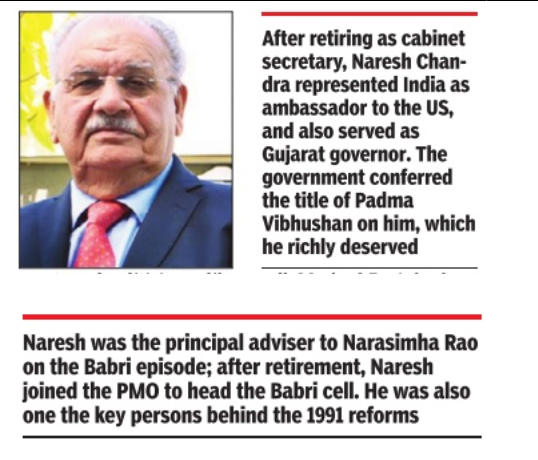Naresh Chandra
This is a collection of articles archived for the excellence of their content. |
1934-2017: A biography
Naresh Chandra, former cabinet secretary who passed away in Goa on Sunday evening after a cardiac arrest, held key positions in the Centre and state governments, with assignments in the economic, infrastructure, regulatory and social sectors, including the posts of defence and home secretary , in all of which he distinguished himself. A 1956 batch IAS officer of Rajasthan cadre, he was one of the three or so out of 30-plus postindependence cabinet secretaries who carried with him the experience of being the chief secretary of a state.
After retirement, he represented India as ambassador to the US, and also served as governor of Gujarat. A grateful government conferred the title of Padma Vibhushan on him, which he richly deserved.
Outwardly a jovial personality, Naresh carried a sharp and incisive intellect, brought deep thought into every issue, while being strong and prompt where action was required; he was the ideal civil servant. One has seen him take firm positions in different ministries, expressing his views freely and fearlessly , both in his verbal presentations as well as on paper. Soft spoken with much deliberation in his delivery , Naresh carried punch in every word that he uttered -nobody , his minister or his subordinates, could afford to take him lightly .
He was superior in intellect and comprehension to most that he met, civil ser vants and politicians alike.He had a healthy ridicule and mild contempt for most politicians who headed his ministries (I knew that he had respect just for three or four politicians of the day). He would, however, not be patronising to anyone, nor would he ever show any subservience. He knew that he was the reverse of the governance coin, on the other side of the politician; with true democratic spirit, he would cheerfully accept being overruled, while fully knowing that he was right.
Narasimha Rao depended on him implicitly , much as Chandragupta looked upon Chanakya. While Rao and Manmohan Singh were publicly recognised as the face of the 1991 reforms, few know that the two key persons behind the scenes, who played a critical role, included A N Verma, the principal secretary to Rao, and Naresh Chandra.
Naresh was also the principal adviser to Rao on the Babri episode; indeed after retirement, Naresh joined the PMO to head the Babri cell. Much of Rao's book on the fall of Babri Masjid is based on the invaluable research of Naresh. In one conversation with him, when I was chief secretary in UP soon after Babri, he did mention to me that he had clearly posed the alternatives to Rao, and that the final decision was that of the PM (did Naresh hint he had advised otherwise?) Naresh had a subtle but strong sense of humour I once asked him, when he was governor of Gujarat, whether it was incongruous that he headed a dry state? His answer, with a mischievous twinkle, was that it is not necessary that all things be known, in public interest. In long meetings, particularly with discursive long winded presentations, Naresh would quietly study a file, with intense concentration. The actual document addressed by him would be a hidden copy of the Statesman Crossword (London Times), which he would finish in half an hour or so a feat that very few Indians can accomplish! A distinguished member of the breed of post-independence civil servants, imbued with true democratic spirit, immersed in genuine public service is no more. He will be missed by many in India; for me it is a personal loss, having known and admired him for five decades.
